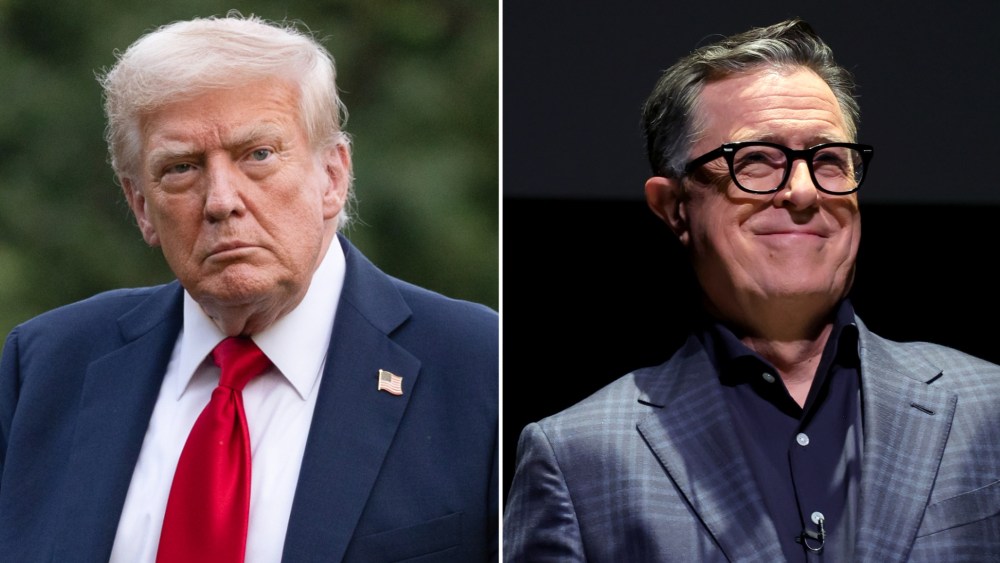Donald Trump says he had nothing to do with CBS cancelling “The Late Show With Stephen Colbert.” In a post to Truth Social on Tuesday, Trump claimed that “everybody” thinks he was “solely responsible” for the end of “The Late Show,” an accusation the Presiden…
Why it matters
- The cancellation of a high-profile late-night show like “The Late Show With Stephen Colbert” raises questions about the influence of political figures on entertainment media.
- Donald Trump's comments highlight his ongoing relationship with the media and how public perception may shape narratives around him.
- This incident could reflect broader trends in the television landscape, especially regarding how late-night programming is evolving in response to political climates.
In a recent post on Truth Social, former President Donald Trump addressed rumors suggesting he was responsible for the cancellation of CBS’s popular late-night program “The Late Show With Stephen Colbert.” The claim, which has circulated in various media and entertainment circles, was directly refuted by Trump, who stated that “everyone” seems to believe he played a pivotal role in the show's demise.
Trump's statement comes amid a backdrop of increasing scrutiny over the interplay between politics and entertainment, particularly as late-night shows have often served as platforms for political commentary and satire. The former president’s assertion that he had no involvement in the show's cancellation may be an attempt to distance himself from the negative implications of such an association.
The late-night landscape has faced numerous shifts in recent years, with various shows adapting to changing viewer preferences and political climates. “The Late Show With Stephen Colbert” itself has been a significant player, often tackling current events and political issues with a humorous lens. Colbert's show, which has aired since 2015, gained notable traction during Trump's presidency, frequently critiquing his policies and actions.
This latest development raises questions about the role of public figures in the entertainment industry. Trump's denial may resonate with his supporters, who often view mainstream media with skepticism, especially when it comes to narratives that portray him unfavorably. By deflecting responsibility for the show's cancellation, Trump not only seeks to clear his name but also to maintain his image as a figure not beholden to the media's whims.
Colbert's show, which has been a staple of late-night television, has undergone various transformations over the years, adjusting its tone and approach in response to the national mood. The cancellation, if confirmed, would mark a significant shift in the television landscape, possibly influencing how other late-night hosts navigate their programming in an era heavily influenced by political discourse.
Furthermore, Trump's remarks reflect a broader trend of celebrity culture intersecting with political narratives. As the lines blur between entertainment and politics, the influence of high-profile figures on programming decisions becomes a topic of discussion among fans and critics alike. Colbert's brand of comedy, which often includes pointed jabs at political figures, has made the show a target for some audiences, creating a polarized view of its content.
In the wake of Trump's statement, discussions surrounding the show's fate have intensified, with fans expressing their opinions across social media platforms. Some have praised Colbert for his comedic approach to politics, while others have criticized the show for what they perceive as bias. This discourse reveals the passionate engagement of audiences with late-night television, highlighting how shows can serve as barometers for public sentiment regarding political figures.
As the entertainment industry continues to navigate the complexities of a politically charged environment, the relationship between figures like Trump and shows such as “The Late Show” will likely remain a focal point of discussion. The dynamics of viewer engagement, influencer impact, and the evolving expectations of late-night programming will shape the future of such shows.
Ultimately, while Trump may deny any responsibility for the cancellation of Colbert's show, the discussions surrounding it underscore the intricate connections between politics and entertainment in today's media landscape. How these interactions play out will be crucial in understanding both the entertainment industry's trajectory and the role of political figures within it.











